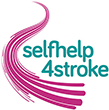Strokes can happen for different reasons, however there are some common questions that get asked following stroke. Lets have a look at these and the advice offered.
Common questions
Q. Why me?
Stroke often happens out of the blue, without warning. Asking ‘Why me?’ is the first step on the process of recovery and learning to cope with the changes a stroke can bring.
Q. What causes a stroke?
Stroke is caused by an interruption of the blood flow to the brain, by either a blood clot (thrombosis) or burst blood vessel (haemorrhage). As a result, brain cells are deprived of the oxygen and other nutrients, which they need. Some brain cells become damaged and others die. No two strokes are the same, and the symptoms depend on the area of the brain affected and the extent of the damage incurred. (Watch the videos above for more information.)
Q. Are there any warning signs before a stroke happens?
For most people stroke happens suddenly, without warning. However, sometimes people do experience symptoms before the stroke occurs, such as dizziness, headache and/or loss of balance. A transient ischaemic attack (TIA) or mini stroke is a clear warning of an increased risk of a stroke and requires medical attention. (Watch the FAST video below for more information.)
Q. Does the way I live have any bearing on stroke?
You can minimise your chance of stroke by paying attention to risk factors such as high blood pressure, smoking, physical activity, what you eat and how much alcohol you drink. (For more information please see our section on How do I keep healthy and Thinking about it and getting started.)
Q. Are strokes caused by high blood pressure?
Persistent high blood pressure is a common risk factor for stroke. Over a period of time high blood pressure can cause damage to the blood vessels and encourages the blood to become stickier and so more likely to clot. Blood pressure should be checked in a healthy person every five years, if ever found to be abnormal it should be checked once a year. (For more information please see our section on Medications.)
Q. Does physical activity help prevent a stroke?
Yes, physical activity can help prevent a stroke. Regular activity is a good way of lowering blood pressure. It will also help control your weight and it leads to favourable changes to the balance of fats in your blood. (For more information please see our section Being Active)
More Information
Key point
If you have any questions about Stroke why not call the Chest Heart & Stroke Advice line free on 0808 801 0899 and speak to one of the specialist nurses.
Lets go on to look at what you should do if you think someone is having a stroke



